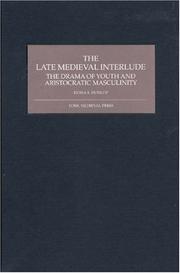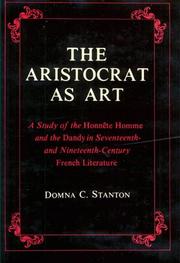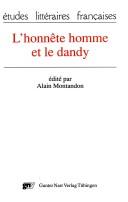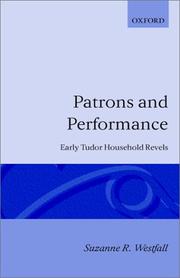| Listing 1 - 10 of 14 | << page >> |
Sort by
|
Book
ISBN: 0191861758 1282948148 9786612948145 0820337323 9780820337326 9780191861758 9780820335728 082033572X 0820346020 Year: 2011 Publisher: Athens [Ga.] : University of Georgia Press,
Abstract | Keywords | Export | Availability | Bookmark
 Loading...
Loading...Choose an application
- Reference Manager
- EndNote
- RefWorks (Direct export to RefWorks)
Book
ISBN: 3031411412 3031411404 Year: 2023 Publisher: Cham, Switzerland : Palgrave Macmillan,
Abstract | Keywords | Export | Availability | Bookmark
 Loading...
Loading...Choose an application
- Reference Manager
- EndNote
- RefWorks (Direct export to RefWorks)
Science, Medicine, and Aristocratic Lineage in Victorian Popular Fiction explores the dialogue between popular literature and medical and scientific discourse in terms of how they represent the highly visible an pathologized British aristocratic body. This books explores and complicates the two major portrayals of aristocrats in nineteenth-century literature: that of the medicalised, frail, debauched, and diseased aristocrat, and that of the heroic, active, beautiful ‘noble’, both of which are frequent and resonant in popular fiction of the long nineteenth century. Abigail Boucher argues that the concept of class in the long nineteenth century implicitly includes notions of blood, lineage, and bodily ‘correctness’, and that ‘class’ was therefore frequently portrayed as an empirical, scientific, and medical certainty. Due to their elevated and highly visual social positions, both historical and fictional aristocrats were frequently pathologized in the public mind and watched for signs of physical excellence or deviance. Using popular fiction, Boucher establishes patterns across decades, genres, and demographics and considers how these patterns react to, normalise, or feed into the advent of new scientific and medical understandings.

ISBN: 1903153212 9786612185571 1282185578 1846155614 Year: 2007 Publisher: [Woodbridge, Suffolk, UK?] : York Medieval Press,
Abstract | Keywords | Export | Availability | Bookmark
 Loading...
Loading...Choose an application
- Reference Manager
- EndNote
- RefWorks (Direct export to RefWorks)
Sensitive study of the 15/16 century interlude, focussing on one of its major concerns, the depiction of male aristocracy and the development to maturity. The commercial theatre of the late sixteenth century is often credited with introducing its audiences to new modes of thought about the self, society and the nation, making them conscious that the self is performed, as an actor performs a role. Yet the earlier interlude drama, originally performed in households and other institutions of the late fifteenth and sixteenth centuries, indicates that the late medieval period was fully aware of the theatricality of identity. This book argues that ideas of performance inform the concepts of aristocratic masculinity developed in the plays 'Nature', 'Fulgens and Lucres', 'The Worlde and the Chylde', 'The Interlude of Youth' and 'Calisto and Melebea'. It examines how the depiction of young male aristocrats in these texts is shaped by ideas of male youth constituted in the middle ages, and shows them as failing or succeeding to perform an adult noble masculinity in the aristocratic body and in aristocratic household. The book also suggests ways in which the plays offer discreet praise and censure of the manner in which their noble patrons performed as aristocrats. Throughout, it brings out the subtle qualities of the interludes, which, the author shows, have been unjustly neglected. Dr FIONA S. DUNLOP is Research Associate of the Centre for Medieval Studies, University of York
Aristocracy (Social class) in literature. --- Drama --- Interludes. --- Young men in literature. --- History and criticism. --- Drama, Modern --- Dramas --- Dramatic works --- Plays --- Playscripts --- Stage --- Literature --- Dialogue --- Aristocracy in literature --- Philosophy
Book
ISBN: 9782862726632 286272663X Year: 2014 Volume: 38 Publisher: Saint-Étienne: Université de Saint-Étienne,
Abstract | Keywords | Export | Availability | Bookmark
 Loading...
Loading...Choose an application
- Reference Manager
- EndNote
- RefWorks (Direct export to RefWorks)
Thème secondaire, mais thème constamment présent dans la littérature poétique ancienne, la richesse et la pauvreté méritaient une étude systématique de leur vocabulaire, et de son emploi. Le lexique de la pauvreté et de la richesse en poésie s'organise essentiellement dans l'opposition entre trois termes abstraits pour la richesse (aphenos, olhns et piaulas) et un pour la pauvreté (penia) : il apparaît donc que l'un des champs lexicaux est privilégié au détriment de l'autre et que la misère matérielle n'avait que peu de place dans la littérature poétique ancienne. Les nuances sémantiques et les variations stylistiques entre aphenos, richesse de prestige, ()Ibos, "bonne" richesse aux connotations divines et aristocratiques, et ploulos, richesse "mauvaise", mortelle, corruptrice et barbare, nous renseignent sur les représentations, notamment entre Grecs et Barbares, et sur leurs évolutions, qui rappellent la montée de la bourgeoisie, notamment industrielle, dans l'occident contemporain, avec la même opposition entre ancienne et nouvelle richesse. Le lexique de la pauvreté, avec penia, reste rare, comme attendu dans une littérature surtout aristocratique, avec les exceptions de Théognis, aristocrate victime de la révolution démocratique, ou Euripide, et Aristophane, qui s'intéressent aux questions de société, et surtout à l'isolement social, affectif, et politique du pauvre. Enfin le p<<ïchos (le mendiant) comporte les mêmes éléments, mépris et exclusion, mais avec la dimension folklorique du "dieu déguisé", et le déguisement d'Ulysse lors de son retour, mythe célèbre qui connaît de nombreuses variations, notamment chez Sophocle et Euripide. Par l'analyse de toutes les occurrences de ces mots dans les plus grands textes de la littérature grecque antique (épopée, lyrisme, poésie tragique), cet ouvrage apporte non seulement la compréhension du statut de la richesse et de la pauvreté dans l'antiquité, niais permet une meilleure compréhension des textes, de leurs enjeux et de leurs intentions.
Greek poetry --- Wealth in literature --- Poverty in literature --- Themes, motives --- Wealth in literature. --- Poverty in literature. --- Themes, motives. --- Greek language --- Aristocracy (Social class) in literature --- Poor in literature --- Greek literature --- Aristocracy in literature --- Etymology --- Greek poetry - Themes, motives

ISBN: 0231039034 Year: 1980 Publisher: New York
Abstract | Keywords | Export | Availability | Bookmark
 Loading...
Loading...Choose an application
- Reference Manager
- EndNote
- RefWorks (Direct export to RefWorks)
Aristocracy (Social class) in literature --- Dandies in literature --- Didactic literature, French --- French literature --- Social ethics in literature --- 391 --- CDL --- Aristocracy in literature --- History and criticism --- Thematology --- anno 1600-1699 --- anno 1800-1899
Book
ISBN: 2840502003 8882292185 Year: 2001 Volume: 102 Publisher: Fasano Schena
Abstract | Keywords | Export | Availability | Bookmark
 Loading...
Loading...Choose an application
- Reference Manager
- EndNote
- RefWorks (Direct export to RefWorks)
Fiction --- French literature --- Lesage, Alain-René --- anno 1600-1699 --- anno 1700-1799 --- Aristocracy (Social class) in literature. --- Aristocratie (Classe sociale) dans la littérature --- Le Sage, Alain René, --- Aristocracy (Social class) in literature --- Aristocracy in literature --- Le Sage, Alain Rene --- Le Sage --- Le Sage, Alain-René --- Aristocratie (Classe sociale) dans la littérature --- Le Sage, Alain René,
Book
ISBN: 3484366087 9783484366084 3110947323 Year: 2006 Volume: 108 Publisher: Tübingen Max Niemeyer Verlag
Abstract | Keywords | Export | Availability | Bookmark
 Loading...
Loading...Choose an application
- Reference Manager
- EndNote
- RefWorks (Direct export to RefWorks)
Mit dem Begriff Festbeschreibung wird ein breites Spektrum von Phänotypen zusammengefasst (Neue Zeitung, lateinisches Epos, Pritschmeisterdichtung, Anthologie diverser Textsorten, illustriertes Diarium), deren gemeinsame Funktion die Vermittlung des höfischen Festes unter zeremoniellen Gesichtspunkten ist. Die Studie zeigt, dass die Topik der Festbeschreibung - im Gegensatz zur Überwältigung der Sinne im Fest - auf eine deutliche Reduktion der sinnlichen Komplexität zielt und allein zeremoniell bedeutsame Zeichen, Handlungen und Namen in den Blick nimmt. Die Funktion der Festbeschreibung wird im Kontext der Wirkungsästhetik des Zeremoniells bestimmt, die sich anhand der Zeremoniellwissenschaft des frühen 18. Jahrhunderts rekonstruieren lässt. Die Untersuchung der Paratexte fokussiert das aporetische rhetorische Selbstverständnis der Textsorte zwischen den Stilansprüchen von Casualrhetorik und Historiographie. Nach einer überblicksartigen Darstellung von Topik und Disposition der Festbeschreibung, die neben dem Text auch Typographie und Illustrationen berücksichtigt, konzentriert sich die Studie auf die Konstituierungsphase der Textsorte im 16. Jahrhundert und ihre topische Revision im späten 18. Jahrhundert: Am Beispiel der Münchener Fürstenhochzeit von 1568 und der Berliner Doppelhochzeit von 1793 werden exemplarisch vier Beschreibungen analysiert, die auf unterschiedliche Weisen das Fest als Utopie entwerfen. Das umfangreiche, kommentierte Verzeichnis der Hochzeitsbeschreibungen im Anhang erschließt detailliert auch die Ausstattung der Drucke.
Aristocracy (Social class) in literature. --- Aristocracy (Social class) --- Marriage customs and rites --- History. --- History --- Germany --- Social life and customs. --- Aristocracy in literature --- Aristocracy --- Aristocrats --- Upper class --- Nobility --- Bridal customs --- Betrothal --- Manners and customs --- Rites and ceremonies --- Weddings --- Aristocracy (Social class) History. --- Aristocracy (Social class) Germany

ISBN: 0804719993 Year: 1992 Publisher: Stanford, Calif. Stanford University Press
Abstract | Keywords | Export | Availability | Bookmark
 Loading...
Loading...Choose an application
- Reference Manager
- EndNote
- RefWorks (Direct export to RefWorks)
Aristocracy in literature --- Aristocratie dans la litterature --- Aristocratie in de literatuur --- Classes sociales dans la littérature --- Crimes of passion in literature --- Crimes passionels dans la littérature --- Passionele moorden in de literatuur --- Social classes in literature --- Sociale klassen in de literatuur --- Aristocracy (Social class) in literature --- French fiction --- -French fiction --- -Literature and society --- -Politics and literature --- -Social classes in literature --- Literature --- Literature and politics --- Literature and sociology --- Society and literature --- Sociology and literature --- Sociolinguistics --- French literature --- History and criticism --- Political aspects --- Social aspects --- Literature and society --- Politics and literature --- 17th century --- 18th century --- 16th century --- France --- French fiction - 17th century - History and criticism. --- French fiction - 18th century - History and criticism. --- French fiction - 16th century - History and criticism. --- Crimes of passion in literature. --- Politics and literature - France. --- Literature and society - France. --- Social classes in literature. --- Aristocracy in literature.

ISBN: 3823346075 9783823346074 Year: 1993 Volume: 54 Publisher: Tübingen: Narr,
Abstract | Keywords | Export | Availability | Bookmark
 Loading...
Loading...Choose an application
- Reference Manager
- EndNote
- RefWorks (Direct export to RefWorks)
Aristocracy (Social class) in literature --- Dandies in literature --- French literature --- Men in literature --- Social ethics in literature --- Aristocratie (Classe sociale) dans la littérature --- Dandys dans la littérature --- Littérature française --- Hommes dans la littérature --- Morale sociale dans la littérature --- History and criticism --- Histoire et critique --- Aristocracy (Social class) in literature. --- Men --- Conduct of life in literature. --- Social ethics in literature. --- Dandies in literature. --- Men in literature. --- History and criticism. --- Conduct of life. --- -Men in literature --- Conduct of life in literature --- -Men --- -Human males --- Human beings --- Males --- Effeminacy --- Masculinity --- Aristocracy in literature --- Conduct of life --- -History and criticism --- -Aristocracy in literature --- Human males --- Aristocratie (Classe sociale) dans la littérature --- Dandys dans la littérature --- Littérature française --- Hommes dans la littérature --- Morale sociale dans la littérature --- French literature - 18th century - History and criticism. --- French literature - 19th century - History and criticism. --- Men - France - Conduct of life.

ISBN: 0198128800 0191671703 Year: 1990 Publisher: Oxford Clarendon
Abstract | Keywords | Export | Availability | Bookmark
 Loading...
Loading...Choose an application
- Reference Manager
- EndNote
- RefWorks (Direct export to RefWorks)
Theatrical science --- anno 1500-1599 --- Great Britain --- 820-2 "15" --- Amateur theater --- -Aristocracy (Social class) in literature --- Nobility --- -Theater --- -Authors and patrons --- -Literary patronage --- Maecenatism --- Patronage of literature --- Sponsorship of literature --- Art patronage --- Literary patrons --- Literature and state --- Dramatics --- Histrionics --- Professional theater --- Stage --- Theatre --- Performing arts --- Acting --- Actors --- Noble class --- Noble families --- Nobles (Social class) --- Peerage --- Upper class --- Aristocracy (Social class) --- Titles of honor and nobility --- Aristocracy in literature --- Amateur plays --- Amateur theatricals --- Nonprofessional theater --- Women in amateur theatricals --- Amusements --- Theater --- Little theater movement --- Engelse literatuur: toneel; drama--?"15" --- History --- -History --- -History and criticism --- -Engelse literatuur: toneel; drama--?"15" --- -820-2 "15" --- Aristocracy (Social class) in literature --- Authors and patrons --- History and criticism
| Listing 1 - 10 of 14 | << page >> |
Sort by
|

 Search
Search Feedback
Feedback About UniCat
About UniCat  Help
Help News
News